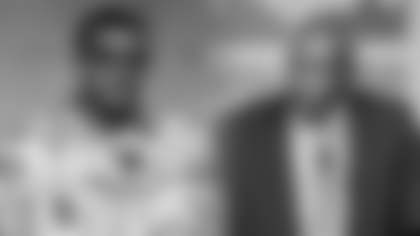The Denver Broncos are in the midst of their offseason workout program, a highly sophisticated operation in a highly sophisticated facility.
There is not a thing for Broncos Country to feel negative about, with the football franchise run by General Manager George Paton, Head Coach Nathaniel Hackett, and of course with the absolutely perfect addition of quarterback Russell Wilson.
There are a lot of players out there working out. But sometimes overlooked is the fact that those players all came from somewhere, and none of them appeared by special delivery of the Easter Bunny.
They were measured, closely watched in terms of growth potential and game presence development, likely for two to four years of college play.
And all of this work was done by scouts.
The scout is the lifeblood of talent acquisition.
When the general manager, often a former scout himself (as Paton is), announces a new player coming to the team, it is after hours, days and weeks of film study and personal observation, often on dusty practice fields while football fans are legitimately focused on something else.
Today, I want to look at one of my favorite scouts and people, Cornell Green.
Cornell is retired now at the age of 82, but when you look at him you just know he played the game. And in Cornell's case, make that "games."
He did not play college football at Utah State University, but he was twice named an All-American basketball player for the Aggies by the Helms Athletic Foundation. While Cornell was selected in the NBA draft, he of course was not picked in the NFL draft. After all, he hadn't played college football.
But this was in the 1960s, and as scouting developed as an art and a science, teams looked at a player and imagined what he might become, not just what he has been.
The Dallas Cowboys led the way in this regard, and the Cowboys looked at Cornell Green and thought "cornerback."
Much later in his career, when he was himself one of the game's great scouts for the Denver Broncos, I asked Cornell how many Pro Bowls he made as a player.
"Five," he said.
How many years did you get shafted out of that honor? I asked.
"All the others," Cornell replied.
Indeed, he was a five-time Pro Bowler for the Cowboys and was picked by the Associated Press as a first-team All-Pro two times (1966-67), as well as a second-team All-Pro in 1968 and 1969. He also was a Super Bowl champion for the Cowboys in Super Bowl VI.
Cornell had 34 career interceptions — including seven in the 1963 season alone — seven fumble recoveries and four defensive touchdowns.
And beyond being a stellar player, Cornell was also a great observer of football. Amazingly, he would be a scout for longer than he had been a player.
He began his scouting career when he was still an active player for the Cowboys in 1970, working as an offseason scout, as the Associated Press reported in 1975. After retiring, Cornell became a full-time scout for Dallas for another four years.
In 1987, his former Cowboys teammate and Broncos head coach Dan Reeves contacted him. The two had been close friends during their days in Dallas, as their lockers were next to one another’s. Cornell joined the Broncos soon after Reeves reached out, and so he started his path to becoming a legend in the scouting field in Denver.
He spent 35 years scouting in the NFL, including 28 seasons for the Broncos. During that incredible second career, Cornell Green received the AFC Scout of the Year Award from the Fritz Pollard Alliance in 2010.
His era with the Broncos spanned Dan Reeves, Mike Shanahan and John Elway.
It is not possible to say how many young players were recommended by Cornell, but the Broncos' success during his time with the team included back-to-back Super Bowl wins, so one can fairly imagine that list of names would be long and impressive.
Of course, none of this begins to reference what a great guy Cornell is and how proud to know him I am, as many, many others are.
Cornell is retired in his beloved Texas now and naturally we don't see him very often.
But I can assure you that anyone in the game, and especially in the world of scouting, knows and respects the scouting legacy of Cornell Green.
Each of those players working out for the Broncos now was once scouted by men just like Cornell, the front line of talent acquisition in the NFL.















